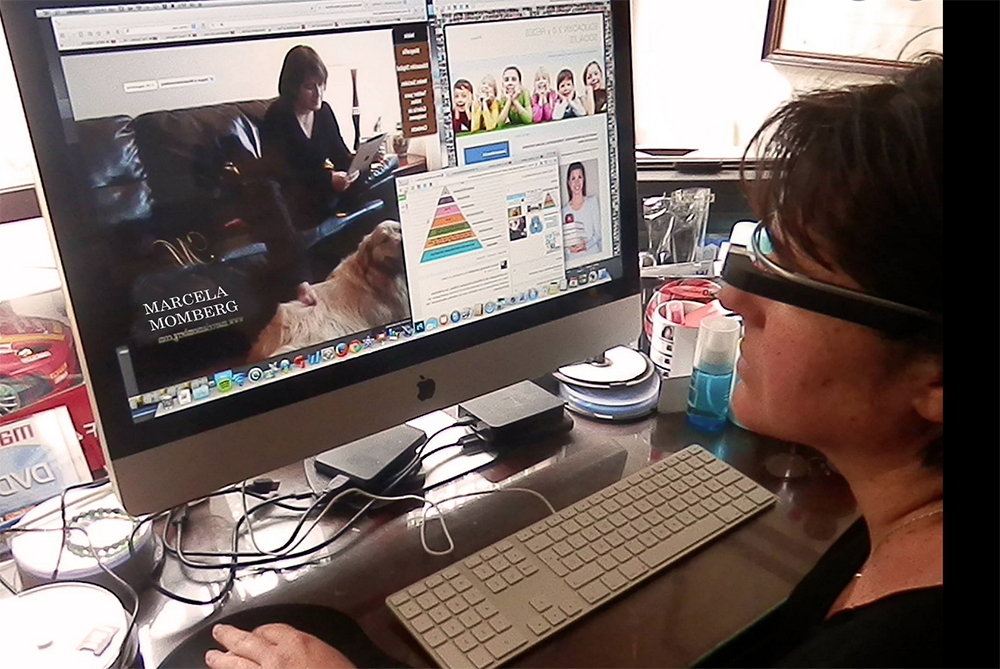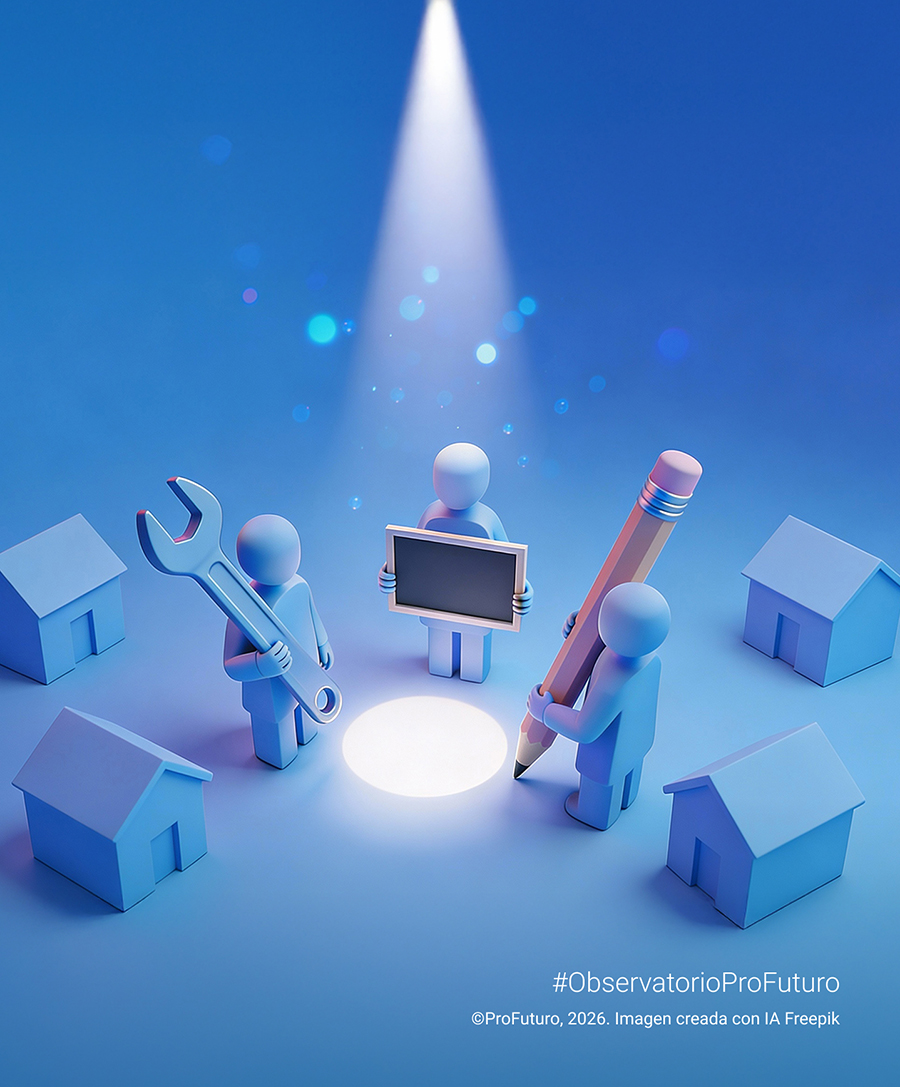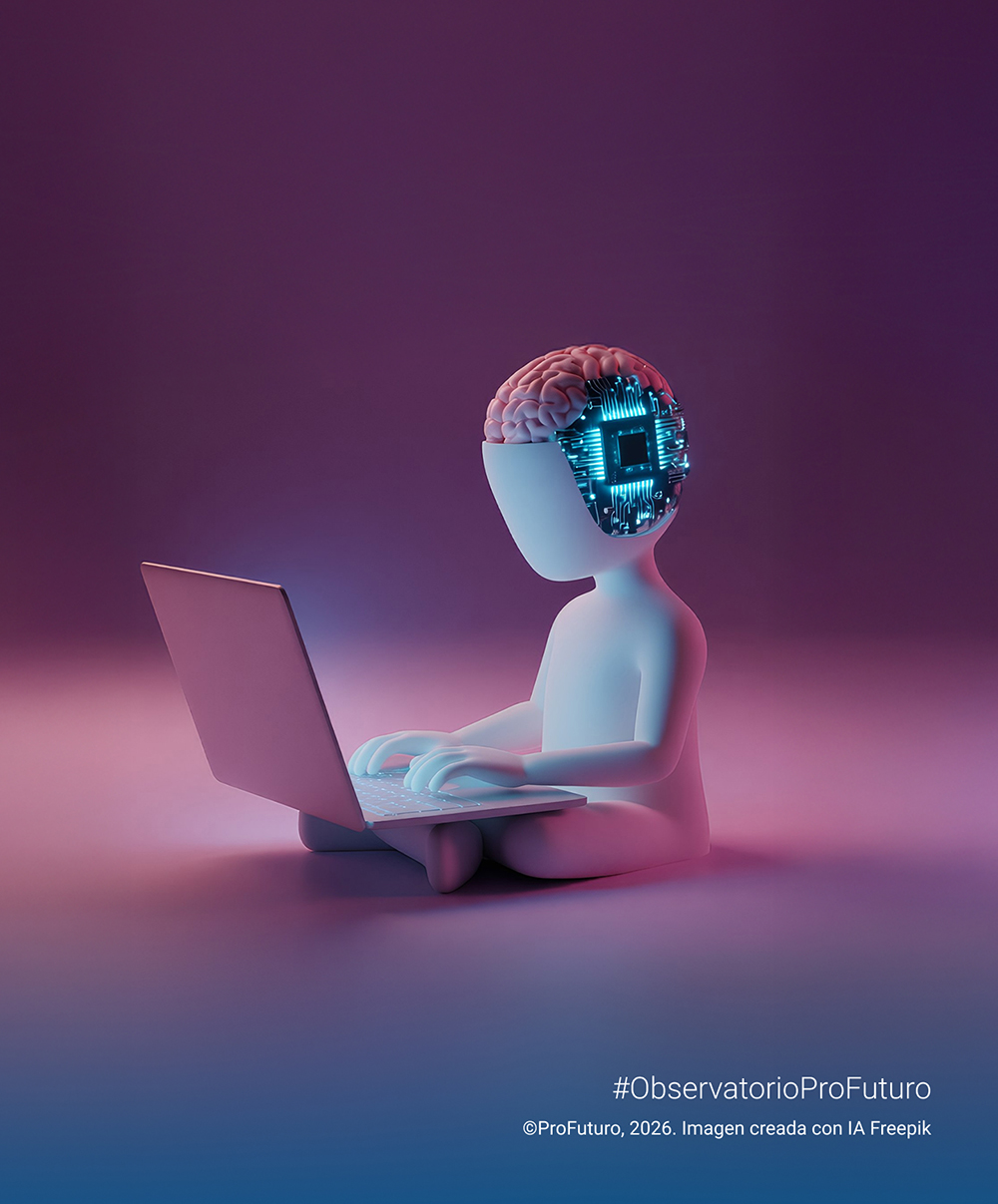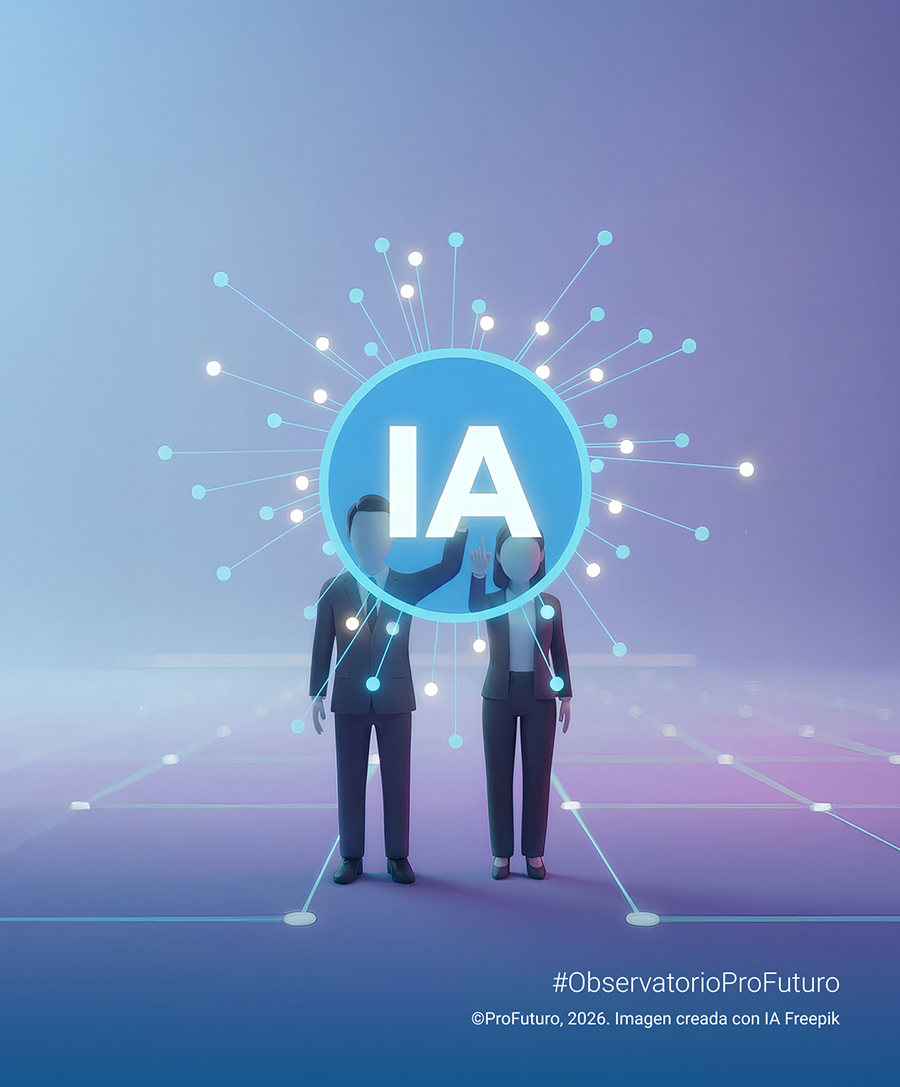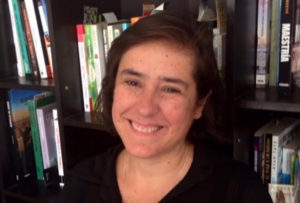
Marcela Momberg’s vocation for teaching grew as she watched her grandmother, a primary school teacher in Chile, change the lives of her students. When she herself became a teacher, she did so with two goals in mind: to have a classroom where divergence had a place of priority, and to level the playing field so that, regardless of geographic location, economic or social status, all her students could achieve their dreams. Today, she has found the ideal vehicle to achieve this: the digital space. It is a space in which she feels comfortable, which allows her to work with other teachers and accompany her students, to grow with them and to be in a continuous learning process.
With more than 25 years of teaching experience, Marcela has been in the digital world for 12 years, learning with her students and sharing her experience with other teachers through courses, conferences and publications. The ProFuturo Observatory spoke to her about digital citizenship: what it is, how it is taught, how to help teachers, what public administrations can do to promote its learning, how to take care of oneself in the digital space… This is what she told us.
Let us start by defining a concept that is fundamental nowadays. What is digital citizenship?
Although it is a concept in permanent reconstruction, we could say that these are the competences that a citizen must have in this hyper-connected era in order to exist in this space. This includes skills to sift through information, to communicate, to take care of oneself, to create in a completely different space, to democratise information. It is a sum of competences that allow us to know what duties and rights we have in a space that is in continuous transformation.
If there is one thing we know for sure, it is that the digital space is reinventing itself every second. Therefore, there will always be a new challenge, a new goal. But if we generate skills from the classroom, with the support from parents and institutions, we will ensure that our students can find, take advantage of and have more and more of the infinite possibilities of this digital era.
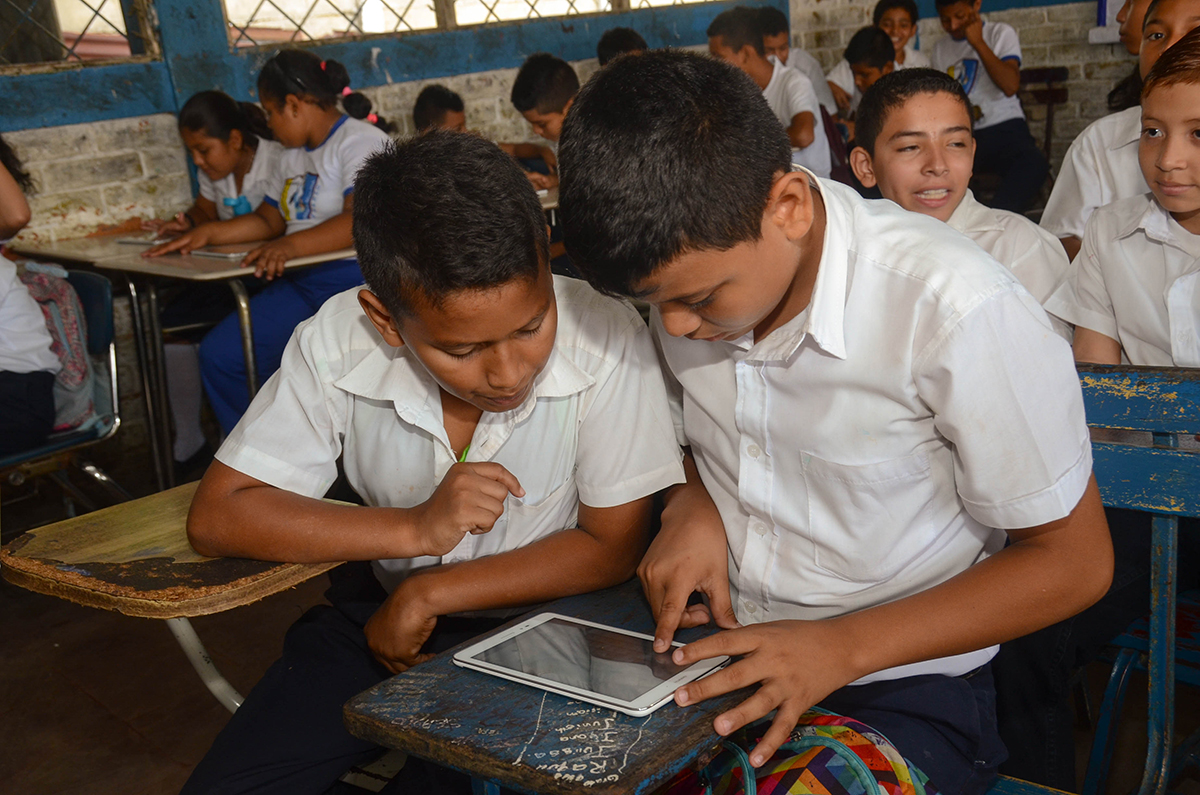
And what are these competences that we need to develop in relation to digital citizenship?
For me the first is sifting through information. We live in a constant invasion of information: from traditional and non-traditional sources. Every person with a simple mobile phone creates information and shares it in real time. Therefore, the first competence would be learning to sift through information: what is valid? When is it fake news? What do we have to share?
The second, linked to this, would be self-care. How do I protect myself in this digital space? How do I know how long I can stay online? How do I know what my children should watch at certain ages?
The third one is communication. How do I communicate what I want to say, how do I participate in political and social discussions? We have to take into account that we all have a duty to participate and contribute in a society that is essentially collaborative.
Therefore, it is important to know how to sift through information, know how to take care of myself and know how to participate and create. These are, for me, the fundamental pillars that should be worked on from the early school years, so that when students reach their last school year, they will be citizens with developed competences and skills. They will be prepared for a changing world.
What can we do, as a family and as a school, to develop these competences?
In the case of families, the first thing is to live in their children’s digital space. And that means living together, sharing, co-creating, knowing beyond parental controls, beyond the digital tools that allow us to observe where our sons and daughters are… It is sharing with them, understanding the importance of the digital space for our children and young people. It means looking at the dangers, looking at the opportunities and making agreements. This will allow them to develop self-care, digital identity and digital responsibility.
As far as teachers are concerned, the issue has several aspects: firstly, they must be given quality university training, appropriate to the 21st century. They must also be accompanied in the process of creating their digital teaching identity and in the development of this identity so that they can manage to educate in a completely different space. Finally, they must be supported in the creation of digital teaching learning communities.
Today, our children and young people are digital orphans, a concept that gave rise to my first book. And why digital orphans? Because when the concept of “digital natives” was born, society thought (wrongly) that, just because they were born in this era, they were born with digital skills and competences and therefore did not need this support. And by not being accompanied, by entering the digital space early and alone, they have not been able to develop the opportunities that this space offers them. If parents and teachers accompany them, their digital experience will be positive.
How do you, Marcela, cope with this orphanhood every day in your classroom?
First, by existing in the digital space. I am an “entangled teacher” and my students call me Miss Twitter because of the number of followers I have. Thus, by setting an example, I try to show them that it is possible to exist positively in an “entangled” world. Subsequently, I design pedagogical strategies to use the networks (Pinterest, Instagram, TikTok, Twitter, Facebook…) pedagogically invaded so that they are clear about what the rules are, what are the codes of communication that allow them to exist and, once more, to take care of themselves. I use active methodologies such as project-based learning, problem-based learning, gamification, visual thinking… and I combine these methodologies with technological tools, starting in the classroom and incorporating parents, who are my best allies.
How do we help teachers learn and teach digital citizenship?
In relation to this, I have strong stance: it is not technology and pedagogy. It is pedagogy and technology. This means that the focus has to be on pedagogy and it is pedagogy in the digital age. We need to accompany them to lose their fear, to lose this obsession that they have to handle all the technologies, all the tools, all the applications of all the networks, because that is not true. What we need is to understand that, in order to educate in this space, we need to work with the tools that we feel comfortable with and to design them pedagogically and observe the impact they have on our students, on the teachers, and also on the parents… They should also be accompanied when posting what they are doing. So, in short: the important thing is helping them to enter the digital space, to design pedagogically, to assess the impact that technologies have on pedagogy, to connect with other teachers who are already making progress and, finally, to give them space to share what they are doing.
Thinking a bit about some of the countries where ProFuturo works, how do you do this in a vulnerable world? In countries without infrastructure, with economic problems and low connectivity?
I believe that, to the extent that one provides tools to the teachers in these places so that, from their reality, they can generate changes, these changes multiply. So yes, it can be done. It is a slow process, it requires a lot of effort, and my great recipe is to call on each of the teachers so that they can be the managers of change. We should start with small changes from our community, from our reality, and to gradually unite those leaders who are generating changes so that this becomes widespread. And that will bring change. With or without Internet. The Internet is not the only way. One can make radical, deep and essential changes with low connectivity, but always connected to the reality of our community. Because if we connect to it, we will be able to involve them. And if they are involved, we already have the first step of a change.
We have talked about the role of families, teachers and the educational community. But what about governments? How can governments make this possible?
There are a number of barriers that governments need to address. The first one, which I believe is fundamental, is to invest in a high-quality internet connection that is affordable for all educational communities. At the same time, it is essential to achieve the teacher training mentioned above. But it is also necessary—and this is the third barrier—to democratise decision-making. The education and teaching community needs to be convened and involved in ministerial decisions. If teachers, parents and other educational agents are participants and co-designers, we will achieve change. But this requires democratisation in decision-making. I believe that the governments have a double discourse: they are called upon, but they are not listened to. If anything, the pandemic has allowed us to connect, co-create and co-design. We have a unique opportunity and we have it now, right now.
At ProFuturo Observatory, we believe in the importance of developing digital citizenship from childhood as a way of being and acting in a responsible way in the digital world. We share Miss Twitter’s way of intertwining pedagogy and technology, putting the didactic purpose before the “technological obsession”; her vision of digital skills; the idea of social networks as a pedagogical and co-learning opportunity with her students, and the relevance she gives to the involvement of families in digital learning processes. Let’s seize that opportunity and turn it into learning and opportunities for all.
No te pierdas el video, con la entrevista.



